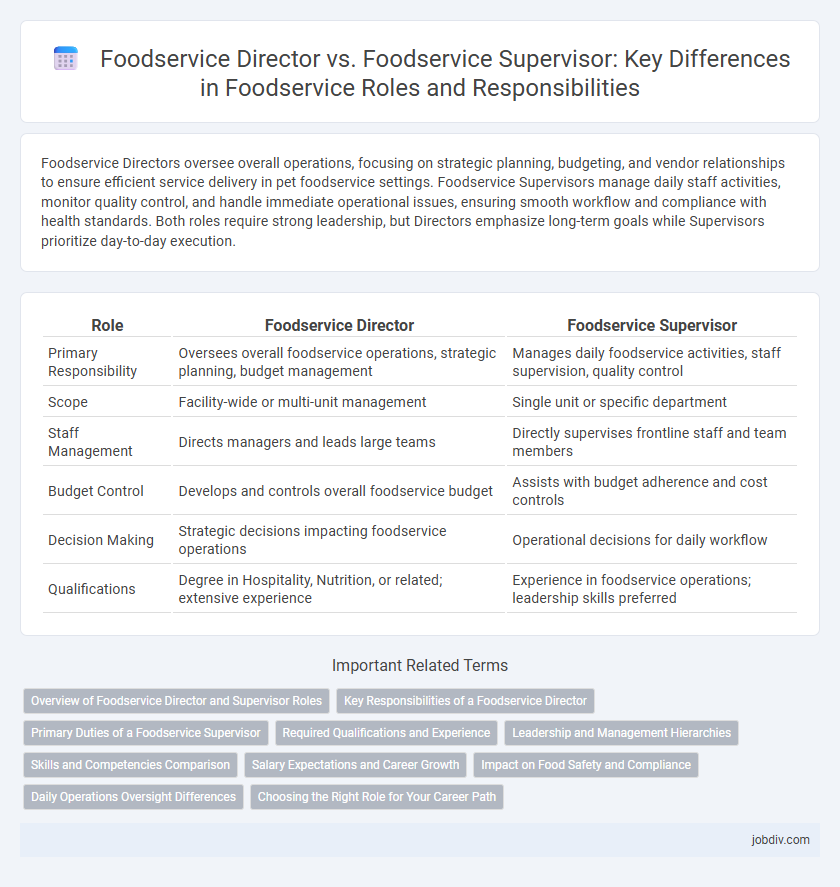Foodservice Directors oversee overall operations, focusing on strategic planning, budgeting, and vendor relationships to ensure efficient service delivery in pet foodservice settings. Foodservice Supervisors manage daily staff activities, monitor quality control, and handle immediate operational issues, ensuring smooth workflow and compliance with health standards. Both roles require strong leadership, but Directors emphasize long-term goals while Supervisors prioritize day-to-day execution.
Table of Comparison
| Role | Foodservice Director | Foodservice Supervisor |
|---|---|---|
| Primary Responsibility | Oversees overall foodservice operations, strategic planning, budget management | Manages daily foodservice activities, staff supervision, quality control |
| Scope | Facility-wide or multi-unit management | Single unit or specific department |
| Staff Management | Directs managers and leads large teams | Directly supervises frontline staff and team members |
| Budget Control | Develops and controls overall foodservice budget | Assists with budget adherence and cost controls |
| Decision Making | Strategic decisions impacting foodservice operations | Operational decisions for daily workflow |
| Qualifications | Degree in Hospitality, Nutrition, or related; extensive experience | Experience in foodservice operations; leadership skills preferred |
Overview of Foodservice Director and Supervisor Roles
Foodservice Directors oversee the entire foodservice operation, managing budgets, establishing policies, and ensuring compliance with health and safety regulations. Foodservice Supervisors focus on daily operations, coordinating staff, monitoring food quality, and implementing the director's plans on the ground. Directors typically handle strategic planning and financial management, while supervisors emphasize team leadership and operational efficiency.
Key Responsibilities of a Foodservice Director
A Foodservice Director oversees the entire foodservice operation, including budgeting, menu planning, staff management, and regulatory compliance to ensure high-quality food and service standards. They develop strategic goals, implement policies, and coordinate with suppliers and health inspectors to maintain efficiency and safety. Foodservice Directors also analyze financial reports and customer feedback to optimize operations and enhance overall dining experiences.
Primary Duties of a Foodservice Supervisor
Foodservice Supervisors primarily oversee daily kitchen operations, ensuring food safety compliance and quality control while managing staff schedules and workflow. They coordinate food preparation activities, monitor inventory levels, and assist with training and performance evaluations of kitchen personnel. Unlike Foodservice Directors who focus on strategic planning and budget management, Supervisors engage directly in operational tasks to maintain efficient service delivery.
Required Qualifications and Experience
Foodservice Directors typically require a bachelor's degree in hospitality management, dietetics, or a related field, along with 5 to 7 years of experience in foodservice operations and leadership roles. Foodservice Supervisors generally need an associate degree or relevant certification and 2 to 4 years of hands-on experience in food preparation, staff management, and customer service. Both roles demand strong knowledge of food safety regulations, budgeting, and team coordination, but directors hold more strategic responsibilities and higher-level decision-making authority.
Leadership and Management Hierarchies
Foodservice Directors oversee overall operations, strategic planning, and budget management, holding the highest leadership role within the foodservice hierarchy. Foodservice Supervisors manage daily staff activities, ensure compliance with health standards, and report directly to directors, occupying a middle management position. The clear distinction between these roles highlights the Director's focus on long-term goals and leadership vision, while Supervisors handle operational execution and team coordination.
Skills and Competencies Comparison
Foodservice Directors excel in strategic planning, financial management, and leadership, driving overall operational efficiency and team performance within large-scale dining environments. Foodservice Supervisors demonstrate strong skills in daily staff coordination, quality control, and troubleshooting, ensuring smooth service execution and compliance with safety standards. Both roles require expertise in food safety regulations, customer service, and effective communication but differ primarily in scope, with Directors focusing on high-level management and Supervisors handling frontline supervision.
Salary Expectations and Career Growth
Foodservice Directors typically earn higher salaries than Foodservice Supervisors, with average annual wages ranging from $55,000 to $85,000 compared to supervisors' $35,000 to $55,000, reflecting the increased responsibility and strategic oversight required at the director level. Career growth for Foodservice Directors often leads to executive roles such as Regional Manager or VP of Foodservice Operations, while supervisors generally advance to director or specialized management positions within specific departments. Salary expectations and career trajectories are influenced by factors including location, size of the foodservice operation, and individual experience.
Impact on Food Safety and Compliance
Foodservice Directors hold ultimate responsibility for food safety protocols and regulatory compliance, developing comprehensive policies that ensure adherence to health standards across the operation. Foodservice Supervisors implement these policies on the ground, directly overseeing daily food handling, sanitation practices, and staff training to prevent contamination risks. Effective collaboration between directors and supervisors is critical to minimizing food safety violations and maintaining compliance with local and federal regulations.
Daily Operations Oversight Differences
Foodservice Directors oversee strategic planning, budget management, and overall operational efficiency, while Foodservice Supervisors focus on daily staff coordination, workflow management, and ensuring compliance with health regulations. Directors analyze performance metrics and implement long-term initiatives to enhance service quality, whereas Supervisors handle immediate problem-solving and direct supervision of kitchen and serving staff. The Director's role demands broader leadership and decision-making responsibilities, contrasting with the Supervisor's hands-on management of day-to-day foodservice activities.
Choosing the Right Role for Your Career Path
A Foodservice Director oversees all operational aspects, including budgeting, staffing, and compliance, ideal for those aiming to lead large-scale foodservice operations with strategic responsibilities. In contrast, a Foodservice Supervisor manages daily activities and frontline staff, focusing on execution and team coordination, suitable for individuals preferring hands-on supervisory roles. Choosing the right role depends on your career goals, whether you seek broad management authority or direct team leadership in the foodservice industry.
Foodservice Director vs Foodservice Supervisor Infographic

 jobdiv.com
jobdiv.com